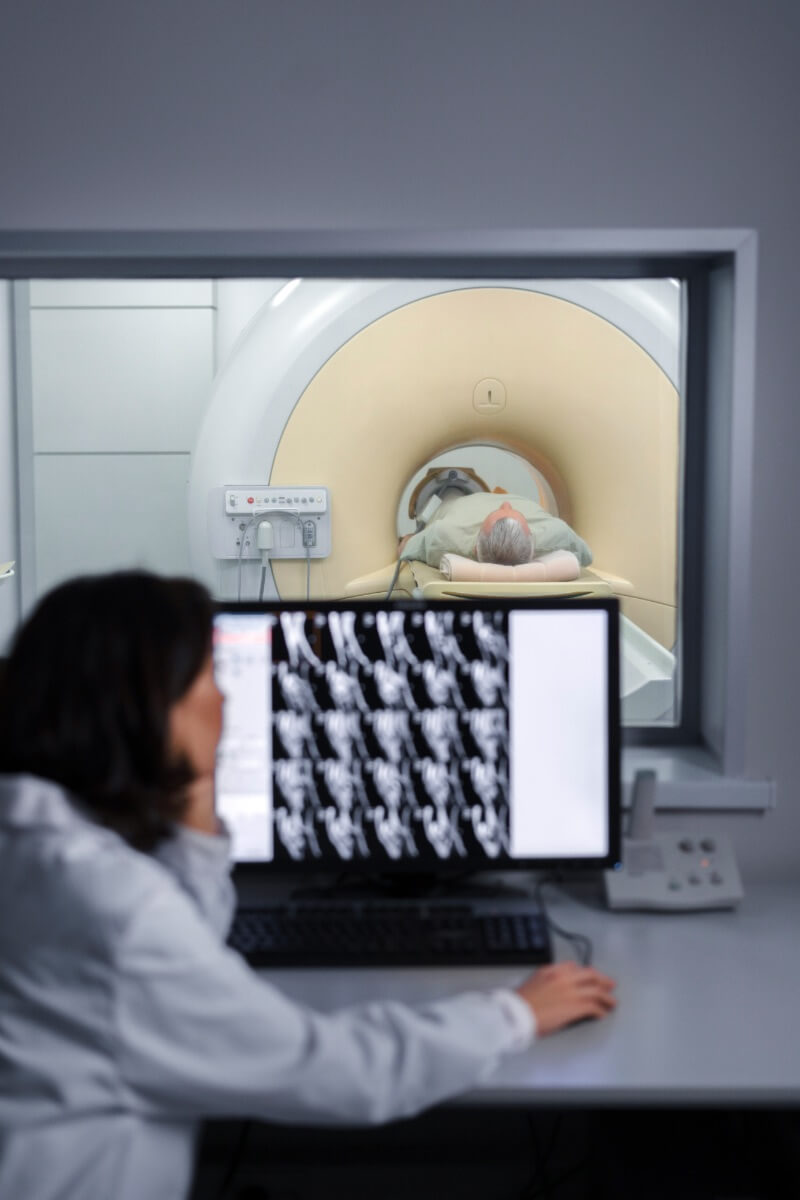The general surgeon deals with the diagnosis and treatment of a wide range of diseases that are mainly related to organs and tissues in the abdominal cavity, then in the chest and thyroid gland. They are also engaged in repairing minor injuries and cuts on the body, as well as stitching and bandaging wounds.
What are the symptoms for an appointment with a surgeon?
Symptoms of abdominal surgical diseases may vary depending on the specific disease, but some of the most common symptoms that occur in these diseases are:
- Abdominal pain that can vary in intensity from mild to severe, constant or intermittent, localized in one part of the abdomen or spread to the entire abdominal region
- Nausea and vomiting can occur as a result of digestive problems
- Change of stool, diarrhea, constipation or other problems with digestion
- Loss of appetite and weight loss
- Shortness of breath can occur in some diseases of the abdominal cavity that put pressure on the lungs
- Swelling, bulges and other visible signs on the abdominal wall may indicate the presence of a hernia or other conditions
- Fever and elevated fever are common symptoms of inflammatory conditions that can occur in the abdomen

What symptoms require an urgent examination by a general surgeon?
Acute conditions in abdominal surgery are medical emergencies that require rapid intervention:
- sudden severe abdominal pain that can spread to other parts of the body accompanied by collapse can occur due to mesenteric artery thrombosis, rupture of the abdominal aorta aneurysm or perforated gastric ulcer;
- suddenly arising pain without collapse can continue as an evolution of existing pain of lower intensity or without notice, and is sampled by perforation of the inflamed organ (inflammation of the appendix, gallbladder, colon), abscess formation in the abdomen or ischemic organ in the abdomen (pinching of the small intestine).
They can be accompanied by intense nausea and vomiting, redness, swelling in the abdomen, bloating and gas, blood in the stool, fever and elevated fever.
What does a general surgery specialist do?
A general surgeon is a doctor who deals with the surgical treatment of various diseases and conditions that require surgical intervention. General surgeons can work in a variety of clinical settings, such as hospitals, clinics or operating rooms.
A general surgery specialist usually begins the job of evaluating patients, collecting a detailed history, examination, and laboratory tests to determine the best approach to treatment. He often uses state-of-the-art technology, including CT scans and MRI, to diagnose, treat, and monitor conditions that require surgical intervention. If surgical intervention is required, a general surgery specialist:
- Preparing for surgery when cooperating with other medical professionals which may include planning anesthesia and monitoring the patient during surgery.
- He performs surgical procedures, and can work with laparoscopic equipment that uses small incisions, which reduces recovery and the risk of infection.
- Monitoring the patient after surgery, monitoring progress, monitoring possible complications, and prescribing therapies to relieve pain and prevent infections.
A general surgery specialist works with other medical professionals, including anesthesiologists, nurses, radiologists and other specialists to provide the best possible care to patients.

What diseases does the general surgeon treat?
General surgeons are specialists in the treatment of various conditions predominantly of the abdomen, which require surgical intervention.
Diseases of the abdominal wall
Hernia (the most common is inguinal hernia), hematoma trauma, infections and tumors.
Diseases of the esophagus, stomach and duodenum
Ulcer (ulcer), cancer, reflux disease of the esophagus, gastric hernia or hernia of the esophagus.
Diseases of the small and large intestine
Appendicitis (appendicitis) of the small intestine (enteritis) and colon (colitis), diverticulitis, cancers, bleeding from the intestines, Crohn’s disease, interstitial obstruction.
Diseases of the rectum
Hemorrhoids, pilonidal sinus, fissure, diverticular disease, cancer.
Diseases of the liver of the gallbladder and pancreas
Inflammation of the gallbladder, gallstones, liver cysts, acute and chronic pancreatitis, cancers.
Injuries to the skin and subcutaneous tissue
Stitching and dressing wounds, by removing smaller fat collections on the skin of the trunk, repairing injuries, and can also deal with the need for surgical treatment of an ingrown nail on the foot.
In addition to these, general surgeons deal with other diseases and conditions that require surgical treatment.

Types of specialist examinations performed by the general surgeon?
A general surgeon is a specialist who deals with the diagnosis, prevention and treatment of various conditions that may occur in different parts of the body, and which may require surgical intervention.
The types of specialist examinations of the general surgeon may differ depending on the specific medical problem. Some of the types of specialist examinations that a general surgeon can do:
Examination of the abdomen (physical examination)
It is done to diagnose various problems in the abdominal cavity.
Ultrasound examinations
Ultrasound it is used to visualize internal organs and tissues in the body and diagnose various conditions.
Endoscopic examinations (gastroscopy, colonoscopy)
They allow the general surgeon to examine the inside of organs in the body, including the stomach, intestines, gallbladder, pancreas.
Biopsy
Tissue sampling to diagnose malignant and other neoplasms.
Pre-surgery examination
Prior to the surgery, the surgeon general may conduct various examinations, including physical examination, laboratory blood and urine tests, ECG and other diagnostic tests to assess the general state of health of the patient and identify possible problems that may affect the success of the operation.
Examinations after surgery
After surgery, the general surgeon usually accompanies the patient to evaluate progress and cure. In this case, examinations include physical examination, symptom monitoring, laboratory blood and urine tests, and other diagnostic tests that may be required.
What procedures does the general surgeon use?
A general surgeon usually performs various types of surgical procedures. Most often, the following procedures are performed.
- Surgical treatment of hernia (inguinal hernia, hernia of the anterior abdominal wall)
- Abdominal organ surgeries (vasectomy, splenectomy, resection of the stomach, small and large intestine, pancreas and liver, colorectal surgery, hemorrhoidectomy, lateral sphincterotomy, diverticulectomy, stoma formation and others)
- Diagnostic and therapeutic invasive procedures (punctures of the pleura and abdomen, thorax drainage, laparoscopic surgery, biopsy)
- Emergency surgeries such as trauma surgery, organ rupture, bleeding or infection.
These procedures are just some of the many procedures performed by a general surgeon. The decision on what type of surgery should be performed depends on the nature of the disease, as well as the general condition of the patient.

How to prepare for the examination of the general surgeon?
Preparation for a general surgeon’s examination may vary depending on the reason for the visit, but some general guidelines are:
- Prepare information about your health condition including any previous diagnoses, medications you are taking, as well as any symptoms you have.
- Think about any questions or concerns you may have regarding your health condition.
- Dress appropriately so that it can be easily removed, especially if an examination of the abdomen is expected.
- Get ready for a physical exam that may include a stomach exam, palpation exam, breast exam, or other physical exams depending on the reason for the visit.
- Prepare for laboratory and diagnostic tests that the general surgeon may order before or after the examination. For example, if you are performing endoscopic procedures (gastroscopy, colonoscopy) follow detailed instructions for preparation that will allow performing examinations and better visualization.
Specific guidelines for preparing for an examination depend on your health condition and the reason for the visit, so contact your doctor if you have any doubts or questions about how to prepare for a general surgeon’s examination.
What does a general surgeon’s examination look like?
The examination of the general surgeon may vary depending on the reason for the visit, but in general the examination includes the following steps:
- A medical history, including previous medical diagnoses, medications you are taking, allergies, and other important factors that may affect your health.
- A physical examination that may include examination of scars, swellings, growths, nodules, fat deposits, lymph nodes, examination of the stomach, breasts, thyroid gland, anus and other parts of the body.
- Diagnostic tests that a general surgeon may order, such as laboratory tests, ultrasound, CT scan, endoscopy or biopsy, to make or confirm a diagnosis and evaluate further steps.
- At the end of the examination, the general surgeon will discuss the diagnosis with you and suggest a treatment plan, including options such as medication, surgical procedures, radiation therapy or chemotherapy. It will also give you instructions on how to prepare for treatment and what to expect regarding the treatment process.
The general surgeon’s examination takes 15 to 30 minutes, but it can take longer if diagnostic tests or further examinations are needed.
When should a patient visit a general surgeon?
The patient should see a general surgeon if he has symptoms or conditions that can be treated surgically. These can be various diseases, conditions or injuries that require the intervention of a surgeon. Some of the reasons for visiting a general surgeon include:
- Acute or sudden abdominal pain
- Trauma that can lead to serious injuries to internal organs
- The presence of a nodule, growth or protrusion on the body
- Pain or swelling in the chest, abdomen, rectum or genital area
- Bleeding or discharge from the rectum, urethra or female genitals
- Changes in the stool, such as diarrhea, constipation or the presence of blood in the stool
- Jaundice or changes in the color of urine or stool
- Incomprehensible pain or discomfort in the abdominal area
- Injuries of the skin (wounds) and subcutaneous tissue
The general surgeon monitors the present known diseases (hernias, ulcers, tumors, gallstones, inflammatory bowel diseases) to assess the further continuation of therapy and the timely need for surgical treatment.
The general surgeon may also be involved in the treatment of other conditions that require surgery, such as breast disease or endocrine glands.
It is recommended that you always contact your general practitioner or general surgeon if you have any health problems or questions about the need for surgical treatment.


